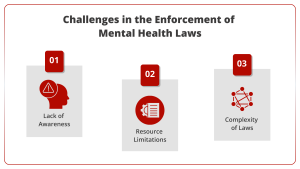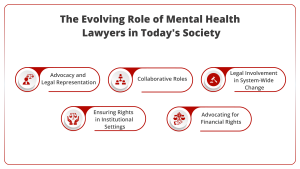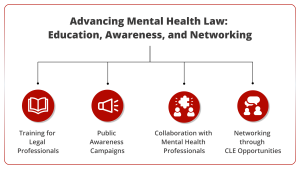The economic impact is just as staggering, with major depressive disorder alone costing an estimated $210.5 billion each year due to healthcare expenses, lost productivity, and broader societal impacts. These figures highlight how important it is to tackle mental health issues thoroughly and effectively.
In this context, the role of mental health lawyers becomes crucial. These legal professionals advocate for the rights and needs of those affected by mental health conditions, ensuring they receive fair treatment under the law and appropriate access to healthcare services.
Their involvement extends beyond individual cases to broader advocacy, pushing for legislative and policy changes that enhance mental health services and promote better understanding and treatment of mental health conditions across society.
Let’s explore the crucial role mental health lawyers play in advocating for those impacted by mental health issues and how they drive substantial changes in the treatment and perception of mental health across various aspects of life.
Understanding Mental Health Law
Mental health law in the United States focuses on the rights and obligations of individuals who have mental health conditions, as well as the duties of those who care for them and the institutions that provide that care. This branch of law deals with a variety of issues, including:
- Forced admission of individuals to mental health facilities (civil commitment),
- Ensuring access to necessary mental health treatments, preventing discrimination in work or living situations,
- Providing legal defense for those with mental illnesses who face criminal charges.
The primary aim of mental health law is to safeguard the rights and well-being of people with mental health conditions while also considering the safety and interests of the wider community.
Legal Framework and Rights Protection for Mental Health
Two fundamental pieces of legislation play a crucial role in safeguarding the rights of individuals with mental health conditions in the United States:
- Americans with Disabilities Act (ADA): This law prohibits discrimination against individuals with disabilities, including those with mental health disorders, in all areas of public life, including jobs, schools, transportation, and all public and private places that are open to the general public. The ADA ensures that people with mental health conditions receive the same rights and opportunities as everyone else.
- Mental Health Parity and Addiction Equity Act (MHPAEA) requires health insurers and group health plans to provide the same level of benefits for mental health and substance use treatment and services they do for medical and surgical care. It aims to eliminate the practice of insurers providing less favorable mental health benefits than physical health problems.
- Rights of the Mentally Ill: Individuals with mental health conditions are entitled to specific rights under the law, which include:
-
- Right to Treatment: Patients have the right to receive timely and appropriate health care for their mental health conditions, which should be on par with the care provided for physical health issues.
- Right to Refuse Treatment: Patients can decline treatment if they do not consent to it, except in cases where they are a danger to themselves or others or incapable of making decisions independently.
Challenges in the Enforcement of Mental Health Laws
Despite clear laws and regulations, enforcing these can be challenging:
- Lack of Awareness: Both patients and healthcare providers may not always be aware of the rights and protections afforded under the law, leading to unintentional violations.
- Resource Limitations: Insufficient resources, such as funding for mental health services, may hinder effectively applying these rights.
- Complexity of Laws: The complexity of laws and the interplay between different jurisdictions can complicate the enforcement of rights, requiring specialized legal knowledge.
Mental health lawyers play a critical role in addressing these challenges. They help by educating clients and healthcare providers about their rights, advocating for patients in cases of rights violations, and navigating the complexities of the legal system to ensure that the rights of individuals with mental health conditions are protected and upheld. Their expertise is essential in bridging the gap between legal theory and practical, enforceable solutions that respect the dignity and rights of the mentally ill.
The Evolving Role of Mental Health Lawyers in Today’s Society
Mental health law has significantly evolved, adapting to changes in medical practices and societal attitudes towards mental health. Mental health lawyers in the U.S. are dedicated advocates for the rights of those with mental health conditions. They work to ensure that these individuals are treated fairly under the law, that their rights are protected, and that they have the support and legal backing needed to lead fulfilling lives.
Advocacy and Legal Representation
Mental health lawyers serve as advocates for those caught up in the psychiatric system. They are not adversaries to the psychiatric profession but champions for their clients, striving to ensure their rights are respected and upheld. This includes fighting for their client’s rights to access treatment, challenging involuntary civil commitments, and ensuring fair treatment within the legal system.
Collaborative Roles
Mental health lawyers often require a collaborative approach that extends beyond the legal field to include healthcare professionals and social workers. For example, consider the case of a client facing involuntary commitment. A mental health lawyer might coordinate with psychiatrists to assess the client’s condition and needs accurately. Mental health lawyers can advocate for their clients’ rights and well-being more effectively, ensuring that a deep understanding of mental, physical, and socio-economic factors informs each legal strategy.
Legal Involvement in System-Wide Changes
Mental health lawyers also play an important role in advocating for system-wide changes in the mental health system. This includes challenging outdated practices and policies that do not serve the best interests of those with mental health conditions. By pushing for reforms, mental health lawyers help shape a more responsive and just mental health system.
Ensuring Rights in Institutional Settings
One critical role of mental health lawyers is representing individuals in involuntary civil commitment hearings, habeas corpus release hearings, and other proceedings that determine a person’s rights and status within mental health institutions. These lawyers ensure that the legal standards for commitment and treatment are strictly followed and advocate for patients’ rights within these settings.
Advocating for Financial Rights
Mental health lawyers play a crucial role in advocating for patients’ financial rights. This includes ensuring patients can control their assets and access benefits like Social Security Income (SSI), particularly when institutions lose accreditation and benefits are at risk.
Mental health lawyers represent clients and educate the public on mental health issues and legal rights. They engage in policy development and advocacy to enhance mental health care and reduce stigma around mental illness.
The Role of Mental Health Lawyers Across Different Legal Areas
Mental health lawyers play a crucial role in various legal fields beyond direct mental health advocacy, ensuring that individuals with mental health conditions receive fair treatment across different legal environments. Here’s how they operate within employment law, family law, and healthcare law:
I. Employment Law
Workplace Accommodations and Discrimination: They ensure employees with mental health conditions receive necessary accommodations and fair treatment under the Americans with Disabilities Act (ADA).
II. Family Law and Guardianship
Custody and Guardianship Cases: In guardianship cases, mental health lawyers work to protect the interests of those who may not be in a position to make decisions for themselves due to mental health conditions. Lawyers advocate for the best interests of individuals with mental health issues, influencing parental rights and guardianship decisions.
III. Healthcare Law
Access to Care and Insurance Disputes: They help clients secure coverage for mental health treatments and resolve disputes with insurers under the Mental Health Parity and Addiction Equity Act.
Advancing Mental Health Law: Education, Awareness, and Networking
Let us explore how education, awareness, and networking strengthen the impact of mental health lawyers in advocating for change.
- Training for Legal Professionals: Specialized training in mental health law is essential for lawyers and judges to handle cases involving mental health issues effectively. Continuous legal education (CLE) programs focused on mental health law can equip legal professionals with the necessary skills and knowledge.
- Public Awareness Campaigns: Educating the public about mental health issues is crucial in changing perceptions and reducing stigma. Awareness campaigns can inform people about the rights of those with mental health conditions and the importance of mental health care.
- Collaboration with Mental Health Professionals: Lawyers working with psychiatrists, psychologists, and social workers can lead to better client outcomes. This interdisciplinary approach ensures a holistic view of each case, combining legal and medical expertise.
Networking through CLE Opportunities: Networking is critical to professional growth and advocacy in mental health law. Participating in Destination CLE trips provides legal professionals with valuable educational content and fosters connections with peers who share a focus on mental health advocacy. These networking opportunities can enhance collaboration, share innovative legal practices, and build a community of advocates equipped to handle the complexities of mental health law.
New legal challenges and opportunities emerge as healthcare policies evolve and public awareness grows. These trends require lawyers to stay informed about changes affecting their practice and advocacy. Lawyers can significantly influence the legal field by advocating for changes that enhance mental health services and safeguard individual rights.
Enhance Your Legal Practice While You Travel with an Eduvacation℠!
Destination CLEs redefine the way legal professionals meet their continuing education requirements. Our conferences blend educational opportunities with cultural immersion in some of the world’s most captivating cities.
Why Choose Destination CLEs?
- Meet CLE Requirements: Fulfill your mandatory CLE credits through engaging, high-quality seminars in stunning global locations.
- Transformative Learning: Turn the usual lecture-based learning on its head by engaging in sessions as dynamic as the destinations.
- Networking Opportunities: Connect with peers worldwide, expanding your professional network in settings that encourage collaboration and growth.
- All-Inclusive Experience: Enjoy comprehensive packages that cover educational sessions, accommodations, and unique cultural experiences, making your learning adventure seamless and memorable.
- Efficient Credit Earning: Earn required CLE credits efficiently, with schedules that balance professional development and exploration.
Plan your next educational journey with Destination CLEs and ensure extraordinary professional development. Our 2024-2025 lineup includes diverse locales such as Lisbon, Puerto Vallarta, Dubai, Havana, and an Alaska Cruise—each offering a distinct blend of legal education and local culture.
Secure your spot today and become part of a community dedicated to professional growth and networking.
DestinationCLEs.com is a participant in the Amazon Services LLC Associates Program, an affiliate advertising program designed to provide a means for sites to earn advertising fees by advertising and linking to Amazon dot com.













